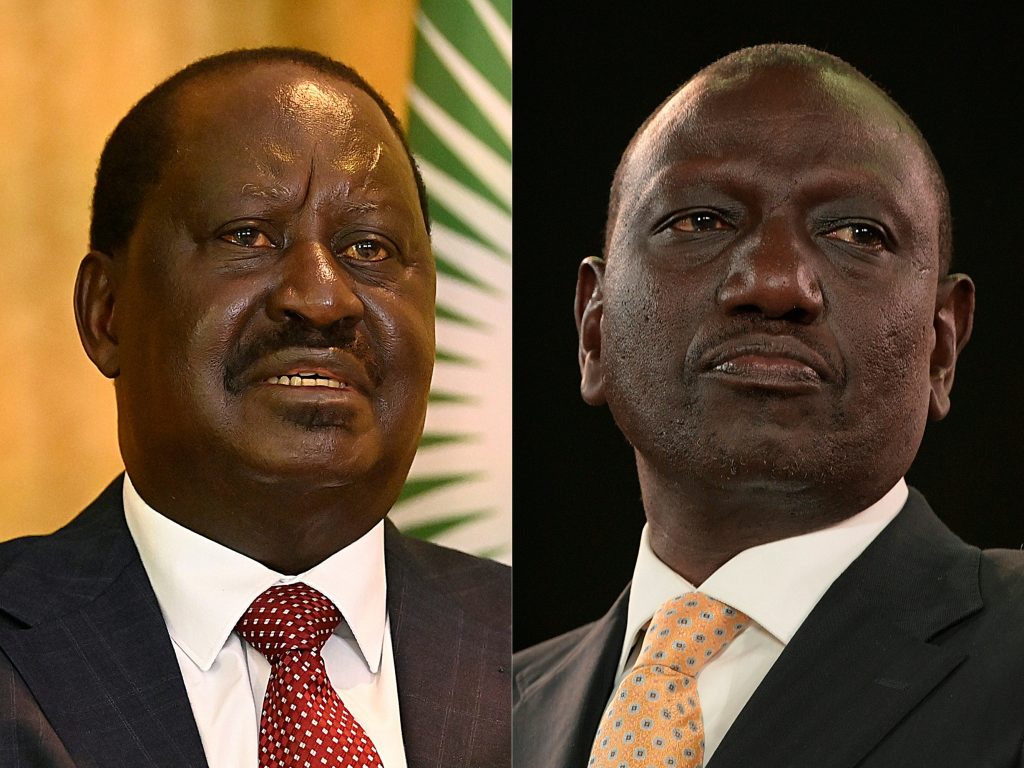
Kenya’s government and opposition announced Saturday they had agreed to form a joint committee “to resolve our differences amicably,” following weeks of street protests that sometimes turned deadly.
President William Ruto’s government has endured nine days of demonstrations since March, when his rival Raila Odinga called Kenyans onto the streets over a cost of living crisis.
Twenty people have died in the unrest, according to official figures, spurring calls for the two sides to find a political solution to the standoff in one of East Africa’s most stable democracies.
Odinga, who claims last year’s presidential election was “stolen” from him and says Ruto’s government is illegitimate, had ruled out talks without a third-party mediator.
But in a statement, his Azimio alliance said “facilitation” by former Nigerian president Olusegun Obasanjo had resulted in an agreement to form a 10-member committee of equal representation to iron out their differences.
“Determined to resolve our differences amicably for the benefit of all our people, we have therefore agreed with Kenya Kwanza to establish a committee,” Azimio said, referring to the ruling party alliance.
A joint statement by both parties said the committee would be comprised of four MPs, four members from outside parliament, and the majority and minority leaders from the national assembly.
Among other issues, it would discuss reforms to the electoral committee and the establishment of an office for Odinga, who has lost five elections and alleged cheating in many of them.
Both parties agreed that opposition to a controversial financial bill signed into law in June “should be decided in court,” where it is being challenged.
The law raises taxes and was seized upon by Odinga during the protests.
– Condemnation of violence –
Odinga called off demonstrations in April and May after Ruto agreed to dialogue through a similar joint committee, but those talks broke down and the opposition returned to the streets.
The demonstrations sometimes spiralled into looting and deadly clashes with police, with rights groups condemning the use of tear gas and live rounds to disperse stone-throwing protesters.
Azimio says 50 people died in the marches and laid flowers at vigils this week for the victims of “unprecedented police brutality”.
Ruto has repeatedly called for a halt to the protests and vowed to clamp down on any sign of “anarchy”.
In their statement, the two parties offered “joint condemnation and regrets of violence that has visited our nation with loss of life, serious injuries and the destruction of properties.”
Critics accuse Ruto of rowing back on promises made during his election campaign last year, when he pledged to improve the fortunes of impoverished Kenyans.
The rags-to-riches businessman imposed hefty new taxes this year, further adding to the economic misery endured by ordinary Kenyans.
As the demonstrations have dragged on, appetite for the protests has flagged, with Kenyans largely ignoring last week’s call for three consecutive days of rallies.
Opposition protests following Odinga’s election loss in 2017 continued until he brokered a surprise pact with his erstwhile foe, former president Uhuru Kenyatta, that became known as “the handshake”.
np/db
© Agence France-Presse